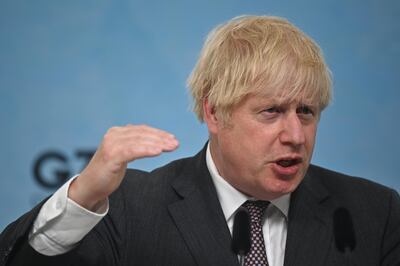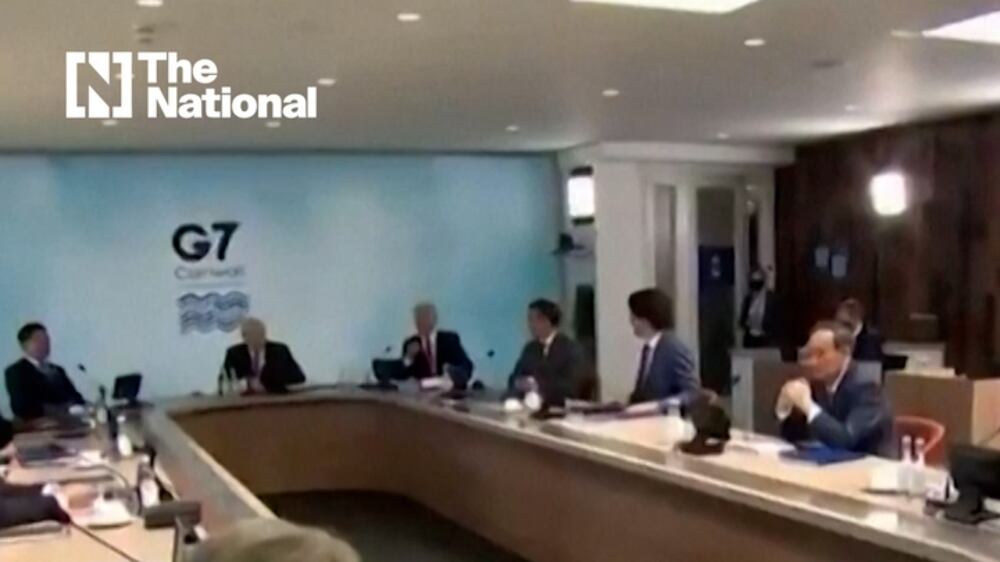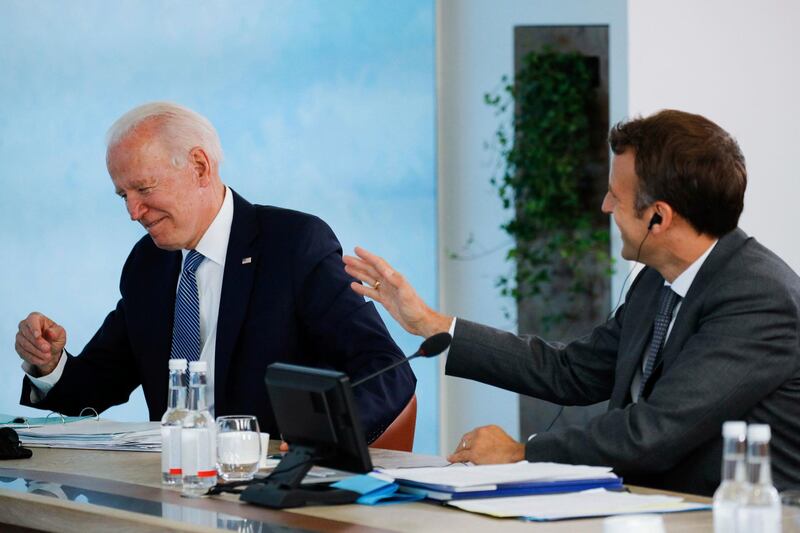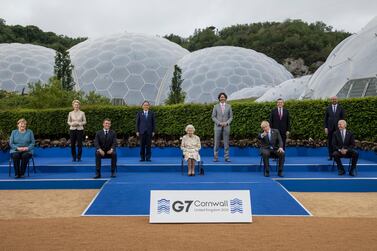Boris Johnson hailed "a big step" towards vaccinating the world on Sunday as the G7 made new commitments to provide one billion doses to poorest countries and the richest nations promised a great global recovery from the Covid-19 pandemic.
"There has been a fantastic degree of harmony," Mr Johnson said after the discussions in Cornwall, England, which marked the first official overseas visit by US President Joe Biden. "We set a target to vaccine the world by the end of next year."
At the heart of the three-day meeting was the response to the Covid-19 pandemic. The group said it would fund or redirect the supply of one billion doses in 2021 to less advantaged countries, having secured 870 extra jabs at the summit. “Total G7 commitments since the start of the pandemic provide for a total of over two billion vaccine doses, with the commitments since we last met in February 2021, including here in Carbis Bay, providing for one billion doses over the next year,” the official communique of the meeting said.
Dr Seth Berkley, ceo of the vaccine alliance Gavi, welcomed the announcement with campaigners calling it a watershed moment. “As we strive towards our goal of ending the acute phase of the pandemic, we look forward to working with countries to ensure these doses pledged are quickly turned into doses delivered,” he said.
The group increased pressure on China to ensure a full explanation on the origins of Covid-19. "We also call for a timely, transparent, expert-led and science-based, WHO-convened, Phase 2 Covid-19 origins study including, as recommended by the experts’ report in China,” it said.
Mr Johnson said the World Health Organisation should have inspection powers comparable to those of the chemical weapons inspectors of the International Atomic Energy Agency.
China was a major focus of the G7 deliberations with the White House pushing hard in public and private for co-ordination between the countries on "supply chain resilience and technology standards so that democracies are aligned".
The communique said the members of the group were particularly concerned about parts of the Chinese economy that were underwritten by western consumer demand. "The US and our G7 partners remain deeply concerned by the use of all forms of forced labour in global supply chains, including state-sponsored forced labour of vulnerable groups and minorities and supply chains of the agricultural, solar and garment sectors – the main supply chains of concern in Xinjiang."

China said a small group of countries don't rule the world. "We always believe that countries, big or small, strong or weak, poor or rich, are equals and that world affairs should be handled through consultation by all countries," a spokesman for the Chinese embassy in London said.
Mario Draghi, the Italian prime minister, said the group was ready to accept American thinking but still wanted to keep lines open to China. "We need to cooperate but we also need to be frank about things that we do not share and do not accept," he added.
A commitment to reach net zero emissions by the group, which represents 40 per cent of the global economy, as soon as possible was included in the text, making good on a pledge first proposed in 2008.
G7 to accelerate global Covid-19 vaccine deliveries, says European Council president

"We commit to net zero no later than 2050, halving our collective emissions over the two decades to 2030, increasing climate finance to 2025, and to protect or conserve at least 30 per cent of our land and oceans by 2030," the statement said.
The G7 agenda on climate change would "drive a global green Industrial Revolution to transform the way we live," Mr Johnson said. The UK Prime Minister said the group would ask all developed countries to make major commitments to fund green infrastructures.
“We reaffirm the collective developed countries' goal to jointly mobilise $100 billion a year from public and private sources, through to 2025, in the context of meaningful mitigation actions and transparency on implementation," the communique said.
“Towards this end, we commit to each increase and improve our overall international public climate finance contributions for this period and call on other developed countries to join and enhance their contributions to this effort.”
Campaigners described the summit's conclusions as having made little progress, given the need for the drive towards carbon neutrality.
“I think poor countries need investment, they need wind farms, they need trains," Max Lawson, head of inequality policy for Oxfam International said. "We need to see a lot more detail and see the scale and how it’s going to be done. And it also looks like it’s for mitigation, to stop these countries emitting more carbon, which is, of course, a good thing, but it doesn’t help the poor people that are being hit by climate change right now. So, yes, it’s probably a good thing, but is it enough? Absolutely not.”
Oxfam also accused the summit of 'cooking the books' on its vaccine distribution announcement.
The G7 meeting looked to upcoming diplomatic engagement with the wider G20 group to push its deal to ensure a global minimum corporation tax that should increase the revenue take from multinationals. "We will now continue the discussion to reach consensus on a global agreement on an equitable solution on the allocation of taxing rights and an ambitious global minimum tax of at least 15 per cent on a country-by-country basis, through the G20/OECD inclusive framework and look forward to reaching an agreement at the July meeting of G20 finance ministers and central bank governors,” it said.
The US leader said that was a landmark deal. "This agreement's going to help arrest the race to the bottom," he said.
The pandemic reminded us prevention is far better and much cheaper than cure. My thanks to Prime Minister @BorisJohnson for steering the health session of the #G7 meeting today to make sure not only we end up this crisis, but also integrate this lesson in policies for the future.
— Kristalina Georgieva (@KGeorgieva) June 12, 2021
The meeting precedes the first face-to-face summit for President Biden with his Russian counterpart Vladimir Putin and members called for changes in how Russia interacts with the world. “We reiterate our interest in stable and predictable relations with Russia and will continue to engage where there are areas of mutual interest," the communique said. "We reaffirm our call on Russia to stop its destabilising behaviour and malign activities, including its interference in other countries’ democratic systems, and to fulfil its international human rights obligations and commitments.”
With the upcoming Nato summit expected to put the seal on the withdrawal of frontline forces from Afghanistan, the G7 members said the group was committed to a smooth exit from the region. “We call on all Afghan parties to reduce violence and agree on steps that enable the successful implementation of a permanent and comprehensive ceasefire and to engage fully with the peace process.”







